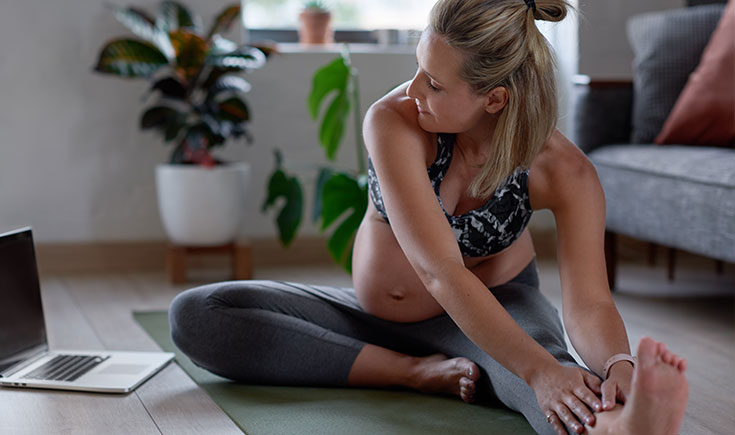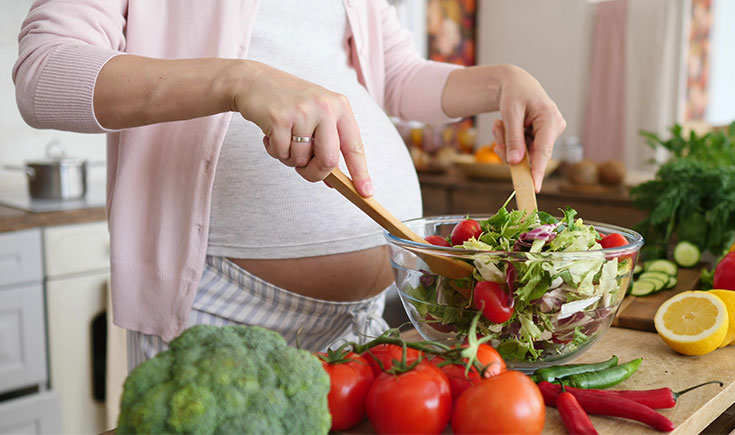

If you’re pregnant or thinking about becoming pregnant, you’ll need to make some changes to your lifestyle to keep you and your developing baby as healthy as possible. You probably already know some of the basic advice, such as not smoking or drinking alcohol, and to rest when you can. Here are our top lifestyle tips to ensure a healthy pregnancy:
Drink more water
One of the most important diet tips for a healthy pregnancy is to make sure you stay hydrated. Not only will drinking 6-8 glasses of water a day keep your skin looking while you’re pregnant, but it can also help to lessen the uncomfortable symptoms such as constipation and bloating that are common during pregnancy. If you enjoy herbal tea to keep hydrated, please read this first.
Eat a well-balanced diet
Providing a healthy home for your growing baby doesn’t mean you need to deprive yourself of all the things you love to eat—just a few small changes is all that’s required to get the nutrients both you and your baby need. Read more here on what foods to avoid, and what foods you need to eat more of.
Take a prenatal vitamin
Your nutritional requirements can increase by up to 50% during pregnancy, but your body requires different support at pre-conception and in the first trimester, than you’ll need in those last few months. If you’re similar to about a third of all women who have difficulty taking tablets, look for a soluble prenatal vitamin that you can drink.
Take Folic acid up until the end of the first trimester.
Build a healthy gut flora
A healthy balance of the ‘gut flora’ is essential for development of a healthy immune system. A mother’s gut flora is likely to be transferred from mother to child during pregnancy. Read more here.
Probiotic (good) bacteria can help build good gut flora. Foods containing probiotics like yogurt are good choice during pregnancy.
Prebiotics are specific foods for probiotics, so eating prebiotic foods keeps the good gut bacteria thriving. Vegetables like artichokes, asparagus, onions, and fruits like bananas and kiwifruit are good sources.
Exercise safely
Keeping fit during pregnancy is beneficial both physically and mentally, but it’s important to get to know your changing body first and attune yourself to the changes that are occurring in you. There are some general rules of thumb with regards to what makes a good prenatal exercise program. You can discover the different forms of exercises for pregnancy from our Health Coach and Fitness Trainer here.
Practice pelvic floor exercises
The pelvic floor is extremely important, and the impact on it by pregnancy and birth is something we can work to minimise from conception. With pelvic floor exercises, women can maintain bladder and bowel control through pregnancy and into motherhood. Read these pelvic floor exercise tips, and the importance of doing them daily, from our Women’s Health Physiotherapist.
Eliminate or reduce toxins
Although many women choose to avoid caffeine completely during pregnancy, experts believe that low to moderate caffeine intake is safe. As for alcohol, current guidelines suggest no alcohol consumption is the safest option. Protecting your baby from tobacco smoke is one of the best things you can do to give your baby a healthy start in life. It’s never too late to stop, read about the effects of smoking to you and your baby.
Educate yourself
One of the best ways to get ready for pregnancy and birth is taking antenatal classes, doing some research, and asking for advice. Knowledge is power. You’ll stress less (hopefully!) and also feel a lot more comfortable during pregnancy and labour because you’ll be focused and prepared. Receive pregnancy week by week updates in your inbox by signing up here.
Manage morning sickness
Up to 80% of women will experience morning sickness during their first trimester, possibly due to hormone levels, causing nausea and vomiting. Ensure that your prenatal vitamin has been formulated to include active morning sickness relief, so you don’t need to take additional supplements for it. If you think you can stomach it, here are our suggestions for the best breakfasts to help manage your pregnancy nausea.
Reduce heartburn and constipation
Heartburn is common, with as many as 80% of expecting mums experiencing it. Find out what the symptoms are, and how to treat it here. Iron is one of the most important minerals you need to maintain in pregnancy. If you’ve been prescribed iron tablets, they can cause terrible constipation. It’s therefore recommended to follow an iron-rich diet, removing the need to take iron supplements. Read here about what to eat to get more iron. Increasing your fluid intake, as suggested previously, will also help to reduce constipation.
Watch your weight gain
It feels good to satisfy your cravings, whatever they may be, but you should be careful about how much weight you gain during pregnancy. Gaining too much can be harmful to you and your growing little one. So, what is a normal weight gain during pregnancy? Find out here.
























